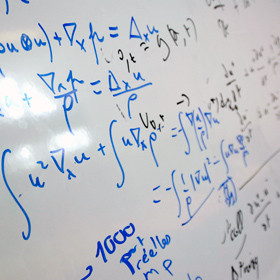Applied Mathematics

The programme is designed as a discovery of mathematics in contemporary scientific issues through intensive research-led teaching and learning.
Objectives
The first year (M1) is structured into three subject-based tracks so students can begin to work towards their intended second year specialization. It also has an advanced track for a limited number of top students (regardless of subject specialization), the Jacques Hadamard track, the main purpose of which is to prepare students for a doctorate in applied mathematics after their master's degree.
In second year (M2), the wide range of courses offered means students can just as easily envisage job opportunities in various sectors of the economy (banking, insurance, aeronautics, health, energy, telecommunications etc.) as go on to PhD research in a university or industrial laboratory.
Bachelors 3
LDD3 : Informatique/Mathématiques : parcours mathématiques
LDD3 : Informatique/Mathématiques : parcours informatique/mathématiques
Masters
Master 1 : first year Master Jacques Hadamard
Program delivered in French.
Publics éligibles
- Be enrolled as a student at ENS Paris-Saclay
- Student of foreign nationality (excluding nationals of the European Economic Area, Andorra, Switzerland or Monaco) whose country of residence is covered by the Études en France scheme
- Student registered in the Jacques Hadamard Master 1 in 2022-2023 and authorised to repeat the year
Entry requirements
- Application dates: 1 March to 31 March 2023 and 1 June to 30 June 2023
- See how to apply.
Masters 2
Master 2 : Mathématics, Vision, Learning
- Refer to the program and application procedures.
- Program delivered in French and English.
- Program open to international students.
Master 2 "Formation à l'enseignement supérieur en Mathématiques"
Master 2 : Modélisation et simulation avec le calcul haute performance
- Consultez le programme et les modalités de candidature.
- Program delivered in French.
- Program open to international students.
Careers
The wide range of courses in the Applied Mathematics major means graduates find employment in diverse sectors of the economy (banking, insurance, aeronautics, health, energy, telecommunications, etc.). A substantial proportion of graduates (approximately one-third) are also expected to undertake a PhD, either in a laboratory or in a company.
